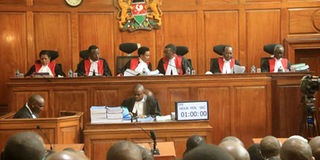Petitioners cannot question Uhuru election win— lawyers

Supreme Court judges at the court on November 15, 2017 during the second day of proceedings of the petition against the October 26 repeat presidential election. PHOTO | JEFF ANGOTE | NATION MEDIA GROUP
Lawyers for President Uhuru Kenyatta have criticised the petitioners challenging his re-election, saying that because they had not voted, they should not be allowed to attack the outcome of a process they were not involved in.
Senior Counsel Ahmednassir Abdullahi characterised the petition as part of a bid by the petitioners, who are members of civil society groups under the banner of Kura Yangu, Sauti Yangu, for foreign financing.
“This petition has nothing to do with public interest litigation. It is a powerful and innovative proposal for donor funding,” said Mr Abdullahi.
LAW
He also argued that the petitioners do not constitute a “person” in the sense outlined in the Constitution and their refusal to participate in the polls meant they should not have challenged the outcome.
“You must litigate over a grievance that has arisen over your rights under Article 38 (political rights). You must have a cause of action under Article 38 (2) (right to free, fair and regular elections). Then, you must be aggrieved as to how your rights were aggrieved by IEBC,” he added.
Mr Abdullahi asked the judges not to see themselves as needing to make a transformative decision.
“This is a political court that interprets the Constitution. Political in the sense that you interpret important political questions of the day. You exercise the highest political power,” said Mr Abdullahi.
Asked by Justice Njoki Ndung’u whether the right to vote included the right not to vote, he said that is not the case.
“When you elect not to vote, you are just invalidating your right to vote. There is no distinct right called ‘The right not to vote.’ You can’t say that ‘I will not participate in this election and then say ‘This election was bad because of A, B, C, D.’ You did not participate in the process,” said Mr Abdullahi.
The same argument was buttressed by Kimani Kiragu who urged the court to examine who the petitioners were, because to him, they cannot be allowed to question a process in which they were not part of.






